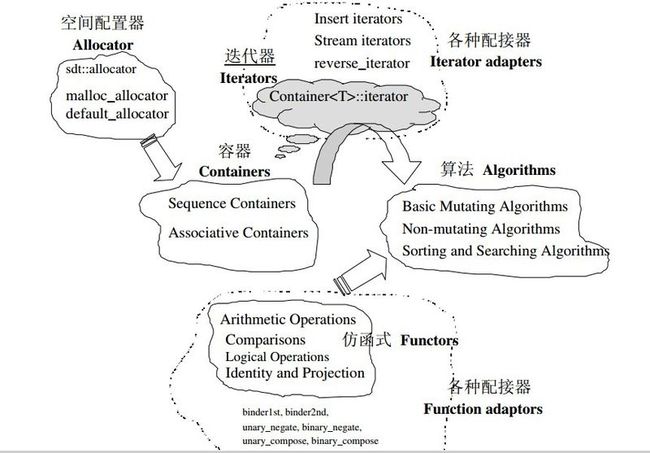分配器内存一步一步写STL:空间配置器(1)
查了好多资料,发现还是不全,干脆自己整理吧,最少保证在我的做法正确的,以免误导读者,也是给自己做个记录吧!
侯捷说:追踪一流程序,并从中吸取养分,模拟着他写的程序,比那些自以为靠自己努力写出来的下三流程序代价高得多,最少我这么认为——世界上99.999%的程序,在STL眼前都是下三流水平!
侯捷老师这句话对STL的评价太高了,以前只是熟练使用STL,知道一点原理,受他的影响,最终还是决议研讨STL的源码,收益颇丰,还是把这个过程记录下来,并想着借助标准库的原理,自己写一个完整的仿STL,我觉得这是一个很大的工程,因为涉及到高等数据结构,强大的算法,泛型编程思维,STL的掌握,强大的C++编码水平,层次庞杂的继承,型别萃取技能,相信这个过程会收益颇丰!毕竟我才大二,时光一大把,我想在我本科期间,做完这一个工程,也无憾了!
下图就是STL的层次分布图,当然还缺乏一些组件,比如数值处置,pair对组,string,智能指针以及valarray数组等等,其中实现的难点重要集中在几个地方,分别是map红黑树的实现,heap算法体系,函数配接器,流迭代器。尤其是函数配接器,他的外部实现简直是穷尽一切顶尖技能,令人叹为观止,我先从最左边的内存分配器开始,因为他是全部的核心!
首先STL的内存分配器(空间配置器)在标准库中充当了异常重要的角色,全部的内存分配,管理,释放都是由他控制,SGI的设计理念就是把内存管理这一块红灯区抽离出来,作为模版参数传递进去每个容器,
比如在vector:
template<class T,class Alloc<T> = allocator<T> >
class vector.........
他使用的是内置的默许内存分配器,在上图中我们看到有两个分配器,这是SGI STL中的高等之处,实作了多级内存分配,利用内存池实现效率上的优化,同时也减少了内存碎片的可能性。
在这之前须要知道两个全局函数 ::operator new 和 ::operator delete ,注意不要把他们和一般的new delete混为一谈,我们的运算符new在分配内存的时候同时调用对象的结构函数初始化内存,而::operator new只是分配内存,并不调用结构函数,这是实现一块无初始化内存池的关键点,同理delete。
另外还须要了解placement new运算符,他是定位运算符,并不分配内存,只是定位到某一已分配区域!
这里我们先实现一个能跟标准容器接口的分配器类,他并不高明,但是表现了标准分配器的必要特性,其实从某个角度说属于SGI版本的一级分配器:
template<class _Ty>
struct Allocator_base
{ //配置器基类
typedef _Ty value_type;
};
template<class _Ty>
struct Allocator_base<const _Ty>
{ //配置器特化于const的基类
typedef _Ty value_type;
};
template<class _Ty>
class Allocator
:public Allocator_base<_Ty>
{
public:
//配置器外部型别
typedef typename std::size_t size_type;
typedef typename std::ptrdiff_t difference_type;
typedef _Ty* pointer;
typedef const _Ty* const_pointer;
typedef _Ty& reference;
typedef const _Ty& const_reference;
typedef Allocator_base<_Ty> _Mybase;
typedef typename _Mybase::value_type value_type;
//配置器型别转换
template<class _other>
struct rebind
{
typedef Allocator<_other> other;
};
//地址函数定义
pointer address(reference value)const{
return &value;
}
const_pointer address(const_reference value)const{
return (const_pointer)&value:
}
//默许结构函数 什么都不干
Allocator() throw() {}
//默许复制结构
Allocator(const Allocator &)throw() {}
//不同配置器的复制结构
template<class _otherAll>
Allocator(const Allocator<_otherAll> &)throw() {}
//析构函数
~Allocator()throw() {}
//返回能分配的最大内存
size_type max_size()const throw()
{ //借助数值函数
numeric_limit<size_type>::max() /sizeof(_Ty);
}
//分配未结构的内存待用
pointer allocate(size_type num,
typename Allocator<void>::const_pointer hint= 0)
{
return (pointer)(::operator new(num * sizeof(_Ty)) );
}
//在内存中结构对象
void construct(pointer p,const_reference value)
{
new(p) _Ty(value);
}
//析构内存中的对象
void destroy(pointer p)
{
p->~_Ty();
}
void deallocate( pointer p, size_type size )
{
::operator delete(p);
}
//为了跟标准配置器接轨,这里只能返回true,下一个只能返回false
bool operator==(Allocator const& a) const
{ return true; }
bool operator!=(Allocator const& a) const
{ return !operator==(a); }
};
//allocator模版特化于类型void的类
template<> class Allocator<void>
{
public:
typedef void _Ty;
typedef _Ty* pointer;
typedef const _Ty* const_pointer;
typedef _Ty value_type;
template<class _other>
struct rebind
{
typedef Allocator<_other> other;
};
Allocator()throw()
{ //还是一样,什么都不干
}
Allocator(const Allocator<_Ty>& )throw()
{ //复制结构,什么都不干
}
template<class _Other>
Allocator(const Allocator<_Other>&) throw()
{
}
template<class _Other>
Allocator<_Ty>& operator=(const Allocator<_Other>&)
{
return (*this);
}
};
最开始是两个基类,这两个基类没有任何成员,只有一个内置型别,这两个基类不是必须的,可以略过,只是表现一种好的设计而已,最后一个类是模版特化了一个void类型,这样做也只是为了使用void的时候不发生未定义行为,从这一点可以看到STL对各种可能的情况都做了充分的预感,我们重要来看Allocator类!
刚开始定义了一对typedef,这是为分配器类定义一堆内置型别,其实也可以不定义啊,只不过在STL中都这样定义,构建出一种同一的类型型别,便利管理和可读性
接下来的
template<class _other>
struct rebind
{
typedef Allocator<_other> other;
};
这是一个分配器转换方法,可以便利的转换为为另一种类型服务的分配器,比如说我们结构的是T类,如果须要结构T*的时候,可以这样使用
Allocator<T>::rebind<T*>::other pAllocator;
这样pAllocator就是一个为T*服务的分配器,详细参考《STL标准程序库》!
该类接下来的函数都是标准接口必须的,不能少任何一个,其中有变动的是这四个 allocate deallocate destory construct
allocate函数分配一片连续的未被结构的空间备用,
deallocate 函数释放空间
construct函数调用布局new,同时调用结构函数,对象被new定位在指定位置
destory 函数调用析构函数,
之所以说这几个函数可变性比较大,我举个例子,假如我们做一个学生成就管理系统,当然须要结构学生类,也就是须要从数据库获得数据来初始化学生对象,那么你就能够在construct里头内嵌SQL语句,在你艳服学生对象的容器中,获得的数据起源不是从键盘输入(参数传入),而是主动的从数据库获得过来,这样岂不是很便利!同理其他几个函数,
这个分配器还是很简单的,就只须要注意那几点,所以我们在写自己的分配器希望和标准容器接口时,须要注意这几点
当前还会使用这个分配器,直接拿来当作SGI STL版本的一级分配器,至于二级分配器,下一节在写!
到此我们可以写个小程序测试一下了:
#include <iostream>
#include <list>
#include <vector>
#include <algorithm>
#include "allocator.h"
using namespace std;
int _tmain(int argc, _TCHAR* argv[])
{
std::vector<double,Allocator<double> > vec_double;
std::list<int,Allocator<int> > list_int;
for(int i=0;i<60;i++)
{
list_int.push_back(i);
vec_double.push_back( double(i)/3 );
}
list<int,Allocator<int> >::iterator it = list_int.begin();
vector<double,Allocator<double> >::iterator io = vec_double.begin();
cout<<"list test:"<<endl;
for(; it!= list_int.end();++it)
cout<<*it<<" ";
cout<<endl<<endl;
cout<<"vector test:"<<endl;
for(;io!= vec_double.end();++io)
cout<<*io<<" ";
system("pause");
return 0;
}
文章结束给大家分享下程序员的一些笑话语录: 祝大家在以后的日子里. 男生象Oracle般健壮; 女生象win7般漂亮; 桃花运象IE中毒般频繁; 钱包如Gmail容量般壮大, 升职速度赶上微软打补丁 , 追女朋友像木马一样猖獗, 生活像重装电脑后一样幸福, 写程序敲代码和聊天一样有**。
--------------------------------- 原创文章 By
分配器和内存
---------------------------------

